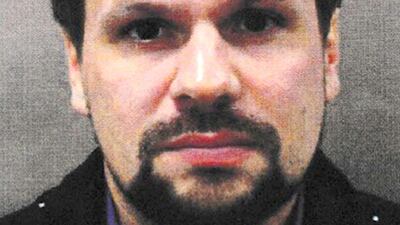A highly-decorated colonel named as one of the suspects for the nerve agent attack on a Soviet former double agent in the UK was probably given Russia’s highest award by president Vladimir Putin.
Ruslan Boshirov – who appeared on Russian state television to declare he was an innocent tourist working in the sports nutrition business – was named by investigative website Bellingcat as military intelligence Colonel Anatoliy Chepiga, who was bestowed with Russia’s highest state award.
Col Chepiga, 39, received the award, Hero of the Russia Federation, in 2014 and common practice suggests it was given out by the president, Vladimir Putin, a former UK military intelligence official who tracked Russian agents told The National. Mr Putin earlier this month insisted the two men were civilians as he denied Russia’s role in the poisoning of Sergei Skripal.
Boshirov was pictured on security camera footage with another man, named by police as Alexander Petrov, in Salisbury at the time of the poisoning of Sergei Skripal using the military grade nerve agent novichok in March.
British authorities are understood to know the real identity of the men and said at the time they were probably aliases but have not publicly named them. The British Defence Secretary appeared to confirm Bellingcat’s findings with a swiftly deleted tweet.
The seniority of Col Chepiga, a 17-year-veteran of Russian special forces, provided further evidence that the attack was approved at a high level within the Kremlin. Col Chepiga and Mr Skripal appear to have followed similar career paths and could have known each other.
“This supplies a stronger link into Putin than has been seen before,” said Philip Ingram, a former British military intelligence officer. “It’s a significant award and whatever he got up has clearly impressed Putin, who would have been briefed.”
The elevated status of Col Chepiga was underlined by his boss at the GRU receiving the award three years later, said Mr Ingram.
_______________
Read more:
UK plans new strike-back cyber force
Skripal suspects: We were just visiting the cathedral
_______________
The British government has repeatedly said that the attack was approved at a senior level of the Russian state, without publicly detailing their evidence. Premier Theresa May told lawmakers earlier this month that it was “not a rogue operation. It was almost certainly also approved outside the GRU at a senior level of the Russian state.”
The timing of the award would suggest that it was for work during secret military missions in Ukraine. He was also deployed three times to Chechnya before being redeployed to Moscow under his new name in 2010, according to records unearthed by Bellingcat.
It published a photograph of Col Chepiga from 2003 that bore a strong resemblance to the bearded Boshirov, who appeared two weeks ago on state-funded network RT. It first identified Col Chepiga from photos of graduates of Russian military academies.
“Utterly predictable news that GRU behind Skripal atrocity,” said former foreign secretary Boris Johnson in a tweet. “What have you got to say, Putin?”
A spokeswoman for Russia's Foreign Ministry, Maria Zakharova, rejected Bellingcat's claim, saying on Facebook that it is part of an "information campaign" against Russia.
Mr Skripal, 67, and his daughter Yulia, 34, both spent weeks in hospital after being exposed to the nerve agent. The Russian team is thought to have brought the novichok to Salisbury in a perfume bottle, which was discarded and then picked up by another couple. Dawn Sturgess, who lived in the town, died after being exposed to the agent. British police are still investigating her death.
The uncovering of Boshirov’s identity adds to suggestions that the attack in Salisbury was riven with mistakes. The death of Ms Sturgess added to political pressure on Russia following tit-for-tat expulsions of diplomats by the UK, its allies and Russia.
The two suspects used passports with similar numbers amid reports that a number of travel documents with consecutive numbers have been used as fake covers for GRU operatives. The identification of those numbers would allow rival intelligence services to potentially track and identify other spies.
“It shows that the Russian intelligence services, who are very, very good, have been a bit sloppy with their administration,” said Mr Ingram.


